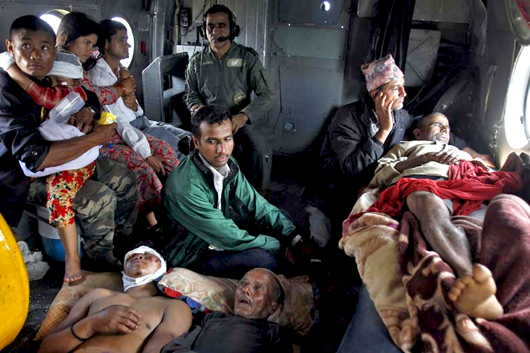Kathmandu, Apr 28: The death toll in the devastating earthquake that has rocked Nepal climbed to over 4,350 today with more than 8,000 others injured, as Prime Minister Sushil Koirala admitted that the rescue and relief operations have not been effective.
Crisis loomed over quake-hit Nepal with an acute shortage of food, water, electricity and medicines as fear of another quake kept tens of thousands of people out into the open.

At least 4,352 bodies have so far been recovered after Saturday's massive earthquake that struck just outside of capital Kathmandu, a Nepalese police official said. A further 8,063 people have been injured in the quake.
Hundreds of people are still trapped under tonnes of rubble in the capital Kathmandu and some of the worst-affected remote mountainous areas amid concerns that toll could cross 5,000 mark, authorities said.
The government has announced nine districts as highly-affected areas.
Based on human casualty, Sindhupalchowk, Kathmandu, Nuwakot, Dhading, Bhaktapur, Gorkha, Kavre, Lalitpur and Rasuwa have been declared as the most-affected districts.
The government has said that altogether 60 districts have been affected by the earthquake.
Of those killed in the earthquake, 923 are from Kathmandu, 240 from Bhaktapur and 157 from Lalitpur while the rest are from outside the Kathmandu Valley.
Meanwhile, Prime Minister Sushil Koirala has admitted that the rescue, relief and search operations have not been effective. He has urged the political parties to work together in this national crisis.
Post-quake management is challenging, Koirala said in an all-party meeting organised yesterday by Constituent Assembly Chairman Subas Nembang.
The government is receiving requests from across the country for help, he was quoted as saying by 'My Republica'. It had been unable to extend rescue efforts to several places due to a crunch of logistics and experts.
The Prime Minister said the government was serious and sensitive about relief distribution and rehabilitation of the affected people.
The government was preparing to send tents, water, medicine, health workers and volunteers to the affected areas. The Premier also appealed to the people to donate blood.
The quake that flattened homes and buildings and the subsequent powerful aftershocks have forced people out to live in the open under plastic tents, barely shielding them from cold and rains that have pounded the city.






Comments
Add new comment